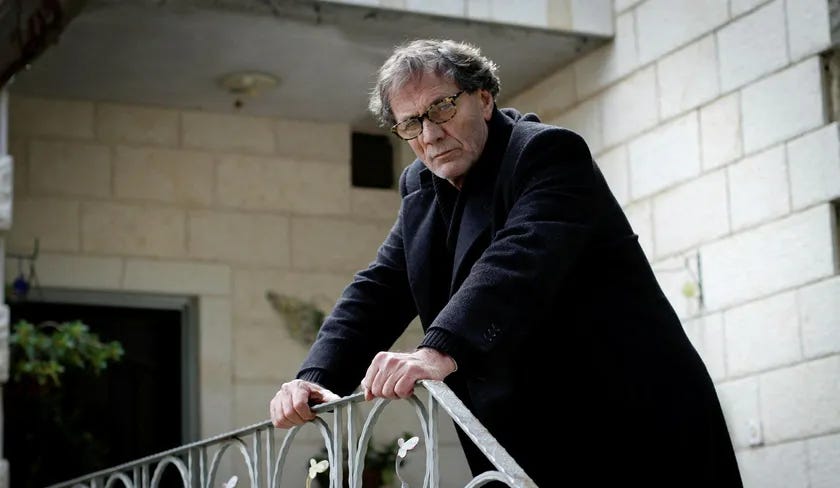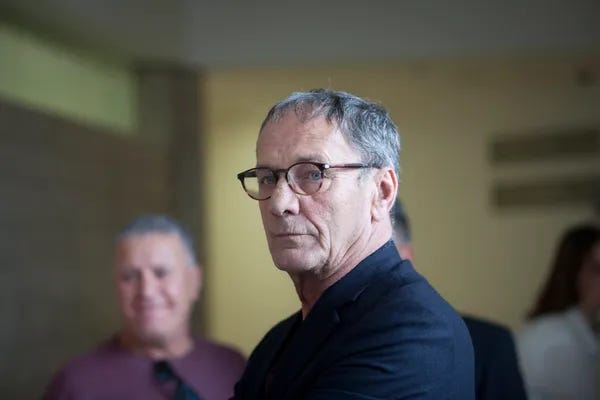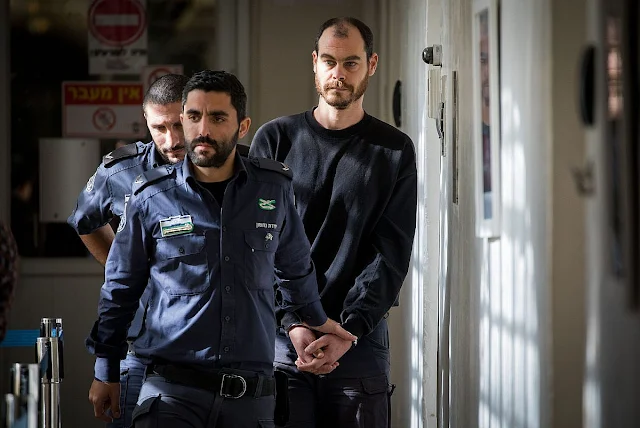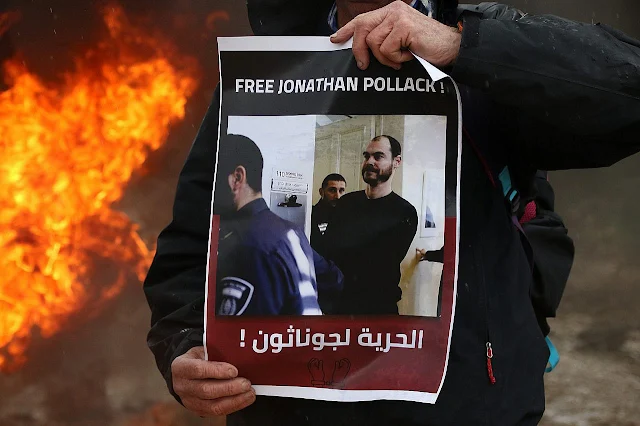Arkel
International, un sous-traitant du gouvernement usaméricain et d’armées du
monde entier, transporte de l’aide vers les sites de la Gaza Humanitarian
Foundation (GHF). Son représentant en Israël est un homme d’affaires, consul honoraire du Rwanda, qui a
précédemment négocié des contrats de défense en Afrique.
Bar
Peleg, Yaniv
Kubovich et Avi
Scharf, Haaretz, 5/8/2025
Traduit par
Tlaxcala
Des
véhicules blindés escortent des camions d’aide humanitaire vers le passage de
Kerem Shalom, à la frontière entre Israël et la bande de Gaza. On peut voir un
graffiti représentant le mot « millénaire » en hébreu sur l’avant d’un camion. Photo : Eliahu
Hershkovitz
Au cours des
derniers mois, un hôtel situé dans un kibboutz du sud d’Israël est devenu le
lieu de résidence de chauffeurs routiers étrangers venus de plusieurs pays d’Europe
de l’Est.
La plupart d’entre
eux sont arrivés en Israël au cours des derniers mois après s’être vu promettre
une opportunité financière qui leur permettrait de gagner un salaire beaucoup
plus élevé que dans leur pays d’origine. Pour gagner leur vie, les chauffeurs
doivent effectuer un trajet quotidien, parfois deux, entre le point de passage
frontalier de Kerem Shalom et les points
de distribution alimentaire à l’intérieur de la bande de Gaza.
Ces
chauffeurs, principalement originaires de Géorgie et de Serbie, pays avec
lesquels Israël n’a pas conclu d’accord bilatéral en matière de main-d’œuvre,
ont été amenés en Israël par une société usaméricaine impliquée dans le projet
d’aide alimentaire dans la bande de Gaza : Arkel International LLC, une
entreprise de construction et de logistique qui opère en tant que sous-traitant
pour la Gaza Humanitarian Foundation (GHF), a appris Haaretz.
La GHF, qui
gère quatre centres de distribution d’aide dans la bande de Gaza, emploie au
moins trois entreprises en tant que sous-traitants.
Jusqu’à
présent, deux de ces sociétés étaient connues : la première est UG Solutions,
qui a participé plus tôt cette année à la sécurisation du corridor de Netzarim
lors d’un échange d’otages et qui s’occupe désormais de certains aspects de la
sécurité sur les sites de distribution de l’aide humanitaire. La deuxième est
Safe Reach Solutions, une société de logistique et d’opérations.
La troisième
société, Arkel International, est responsable de la logistique des opérations
de distribution de l’aide humanitaire.
Selon les
documents constitutifs de la société en Israël, son représentant autorisé dans
le pays est Hezi Bezalel, un homme d’affaires israélien qui a précédemment négocié
des contrats de défense en Afrique. La société
affirme qu’il n’est pas impliqué dans ses activités et qu’il a seulement aidé à
sa création en Israël.
« Je suis
chauffeur routier en Géorgie . Mon patron m’a proposé de venir en Israël par l’intermédiaire
d’un courtier et m’a dit que je pouvais gagner deux fois plus, voire plus », a
déclaré à Haaretz un chauffeur routier de 32 ans, marié et père d’une
fille.
Lorsqu’on
lui a demandé qui l’avait amené en Israël et qui payait son salaire, il a
répondu : « C’est la société Arkel qui nous a amenés ici. C’est elle qui nous
paie nos salaires, et c’est avec elle que nous avons signé le contrat. Notre
travail consiste à partir le matin dans un convoi de camions et à entrer dans
Gaza. L’armée israélienne nous escorte jusqu’à la zone de distribution. Nous
arrivons avec les camions, ils les déchargent pour nous sur le site, et nous
repartons immédiatement. Il y a parfois deux trajets par jour », a déclaré le
chauffeur.
Arkel
transporte des colis alimentaires depuis un point de chargement près de Kerem
Shalom vers des lieux de livraison à l’intérieur de Gaza : trois dans le sud,
près des
ruines de Rafah, et un le long de la partie sud du corridor de Netzarim.
Dans le cadre de ce projet, Arkel a fait venir en Israël des dizaines de
travailleurs étrangers, dont certains chauffeurs routiers d’Europe de l’Est.
Arkel est
enregistrée dans l’État de Louisiane, aux USA, depuis 2005. La société s’est
enregistrée en Israël en tant que société étrangère le 13 mai 2025, une semaine
avant que les centres de distribution de l’aide du GHF ne commencent leurs
activités dans la bande de Gaza et un jour avant l’enregistrement de Safe Reach
Solutions en Israël. Au moins un des dirigeants d’Arkel vit en Israël depuis
octobre 2024.
Hezi Bezalel (né en 1951) est un homme d'affaires, banquier d'investissement et producteur de cinéma très impliqué en Afrique de l'Est (Kenya, Ouganda, Rwanda, Éthiopie) et ami personnel de Paul Kagame
Au moins un
mois avant l’enregistrement officiel de la société en Israël, des discussions
étaient déjà en cours concernant sa création. Comme l’a
précédemment rapporté Haaretz, l’opération d’aide
à Gaza a été lancée par des officiers du commandement sud de l’armée
israélienne, à l’insu de l’ensemble des autorités de défense, et coordonnée par
le bureau du Premier ministre.
Selon une
source proche du projet, Arkel devait initialement construire les sites de
distribution à l’intérieur de Gaza, mais cette tâche a finalement été confiée à
l’armée israélienne.
Dans les
documents constitutifs d’Arkel en Israël, c’est Hezi Bezalel, un homme d’affaires
qui a fondé un opérateur de téléphonie mobile en Israël, négocié des contrats
de défense en Afrique et occupe le poste de consul honoraire du Rwanda en
Israël, qui est désigné comme le représentant de la société en Israël.
La société
lui a donné procuration pour gérer ses activités en Israël, ouvrir et gérer un
compte bancaire pour la société, nommer des avocats et des comptables pour la
société et recevoir des documents juridiques au nom de la société.
La société
affirme que Bezalel n’a fait que l’aider à se lancer en Israël, grâce à une
relation de longue date nouée au fil de projets menés en Afrique depuis des
décennies, et qu’il n’est pas un partenaire commercial. Selon une source bien
informée, Bezalel aurait même obtenu l’accord du ministère de la Défense avant
l’ouverture de la société en Israël.
Un employé d’Arkel
a déclaré à Haaretz que les seuls signataires autorisés au sein de la
société sont aujourd’hui le PDG et le directeur des opérations ; cependant, le
nom de Bezalel n’a pas encore été retiré du dossier de la société auprès de l’Autorité
des sociétés israéliennes.
Actuellement,
l’activité principale de la société consiste à transporter des marchandises
depuis le point de chargement de Kerem Shalom vers des centres de distribution
situés dans la bande de Gaza. Les camions utilisés par Arkel appartenaient
auparavant à la société de logistique israélienne Millennium.
Des photos
obtenues par Haaretz à proximité de Kerem Shalom montrent que le nom de
la société a été grossièrement effacé à la peinture. Selon Arkel, les camions
leur ont été vendus par Millennium.
Millennium a
déclaré que les camions avaient été vendus à un fournisseur, sans toutefois
préciser lequel. Les camions entrent dans la bande de Gaza en longs convois,
sans plaque d’immatriculation, et sont sécurisés par du personnel d’autres
entreprises sous-traitantes.
Comme
mentionné, les chauffeurs sont des travailleurs d’Europe de l’Est, notamment de
Géorgie et de Serbie, pays avec lesquels Israël n’a pas conclu d’accords
bilatéraux pour l’importation de main-d’œuvre.
Des
camions d’aide humanitaire d’Arkel sont garés dans le quai de chargement près
du kibboutz Kerem Shalom, dans le sud d’Israël, dimanche. Les camions n’ont pas
de plaques d’immatriculation et certains portent des graffitis noircissant le nom
« Millennium ».
Photo : Eliahu Hershkovitz
Les
chauffeurs sont logés dans un kibboutz dans le sud d’Israël. « En gros, nous
restons au kibboutz toute la journée, sauf lorsque nous livrons des
marchandises à Gaza », a déclaré un chauffeur serbe. « Nous voulions vraiment
visiter Jérusalem et Nazareth, mais nous ne sommes pas autorisés à trop nous
déplacer à l’extérieur et, jusqu’à présent, nous n’avons pas organisé de visite
touristique. »
Les
chauffeurs indiquent qu’ils gagnent environ 4 000 shekels (1004 €) par mois,
soit plus que le salaire moyen dans leur pays d’origine. « Le travail n’est pas
vraiment dangereux », explique l’un d’eux. « Nous ne distribuons pas la
nourriture. Nous quittons généralement Gaza dès que le chargement est déchargé.
Il y a beaucoup d’explosions et de tirs tout le temps, mais cela ne nous vise
pas, donc dans l’ensemble, c’est sûr. »
La plupart
des chauffeurs interrogés par Haaretz ont déclaré que leur contrat
expirait le mois prochain. « À l’heure actuelle, tout le monde ici est censé
partir en septembre. On ne sait pas si les contrats seront prolongés ou si d’autres
personnes seront recrutées pour nous remplacer. Un responsable a déclaré cette
semaine que nous pourrions rentrer [chez nous] encore plus tôt, dans les
prochaines semaines, car ces convois vers Gaza pourraient devenir inutiles », a
déclaré un chauffeur.
Les
marchandises transportées par les camions – certaines achetées en Israël, selon
TheMarker – sont emballées dans des entrepôts en Israël, en partie au
port d’Ashdod et à Jérusalem, puis chargées dans des camions dans un centre
logistique construit près de la frontière avec Gaza.
TheMarker
a indiqué
que l’une des entreprises responsables était Millennium. Lors d’un entretien
avec Haaretz, le propriétaire de Millennium, Shimon Sabah, a déclaré que
son entreprise ne fournissait plus aucune aide logistique au client impliqué
dans l’aide humanitaire à Gaza et que le fait que le logo n’ait pas été effacé
des camions était dû à une négligence de la part de l’entreprise.
Arkel International
est une société d’infrastructure et de services créée aux USA il y a environ 60
ans et enregistrée en Louisiane depuis 20 ans. Le seul propriétaire de toutes
les actions d’Arkel est George H. Knost III. Le directeur est John Moore.
La société
est un sous-traitant du gouvernement usaméricain et d’armées et de
gouvernements du monde entier, qui gère des projets de construction, d’énergie
et de logistique. Selon le site web aujourd’hui disparu de la société, celle-ci
opère « là où d’autres ne peuvent ou ne veulent pas ».
Depuis 2010,
la société a remporté plus d’une centaine de contrats d’une valeur de plusieurs
centaines de millions de dollars auprès du ministère usaméricain de la Défense
et du département d’État pour des projets en Irak, en Afghanistan et ailleurs.
C’est la première fois qu’elle entreprend un projet civilo-militaire de cette
envergure en Israël.
La société
est également impliquée dans le forage pétrolier et gazier et travaille comme
sous-traitant pour le gouvernement usaméricain, ainsi que pour des armées et
des gouvernements du monde entier, gérant des projets de construction, d’énergie
et de logistique.
Des cartons contenant de l’aide humanitaire sont entreposés du côté gazaoui du point de passage de Kerem Shalom avant d’être distribués par la Fondation humanitaire de Gaza, en juillet. Photo : Ohad Zwigenberg/AP
Malgré les critiques
internationales à l’encontre du projet d’aide à Gaza, Arkel est fière de ce
travail, qu’elle considère comme un soutien à Israël et une aide pour renverser
le contrôle du Hamas sur Gaza. Une source au sein de l’entreprise, s’exprimant
auprès du journal Haaretz, a déclaré qu’elle estimait que la plupart des
critiques à l’encontre du projet étaient « des fausses informations et de la
propagande du Hamas visant à discréditer Israël ».
Travis
Daharash, chef de projet chez Arkel, a déclaré : « Arkel fournit à la GHF un
soutien logistique et en matière de construction. Bien que nous ne fournissions
pas d’informations spécifiques sur notre main-d’œuvre pour des raisons de
sécurité, celle-ci répond à toutes les exigences locales. »
Le
financement du projet d’aide humanitaire est largement opaque et la GHF ne
révèle pas l’identité de ses donateurs. En juin de cette année, environ un mois
après le début des activités du fonds, le département d’État usaméricain a
approuvé un financement de 30 millions de dollars pour l’entreprise. Selon un
rapport de Reuters, cette somme sera versée par l’Agence américaine pour le
développement international à la GHF, dont sept millions de dollars seront
transférés immédiatement.
Jeudi,
Reuters a rapporté que des responsables
de l’administration Trump avaient déclaré au Congrès en juillet qu’Israël
avait accepté de verser une somme équivalente à celle versée par les USA et de
transférer 30 millions de dollars au fonds.
En juin
dernier, Liel Kyzer a rapporté pour la chaîne publique Kan que le
gouvernement avait prévu 700 millions de shekels [175 M€] pour l’aide
humanitaire à Gaza et que cette mesure était financée par une réduction massive
du budget de l’État, y compris des services sociaux.
Le ministère
des Finances et le bureau du Premier ministre ont démenti cette information à l’époque,
affirmant qu’Israël ne finance pas l’aide humanitaire à Gaza.
Les centres
d’aide de la GHF ont
commencé à fonctionner en mai. Ce fonds a été créé par Israël en
collaboration avec des sociétés de sécurité privées.
Des
travailleurs usaméricains et palestiniens gèrent ces centres, tandis que l’armée
israélienne les sécurise à plusieurs centaines de mètres de distance. Chaque
jour, des milliers, voire des dizaines de milliers de Gazaouis viennent
chercher de la nourriture dans ces centres. Malgré les promesses faites par le
fonds au début du projet d’aide, la distribution ne se fait pas de manière
ordonnée, mais dans une bousculade générale pour s’emparer des cartons.
Haaretz a fait état d’un chaos
généralisé sur les sites de distribution, où des centaines de Palestiniens ont
été tués alors qu’ils se rendaient sur place pour recevoir de la nourriture
depuis que le GHF a commencé ses opérations d’aide ces derniers mois.






















